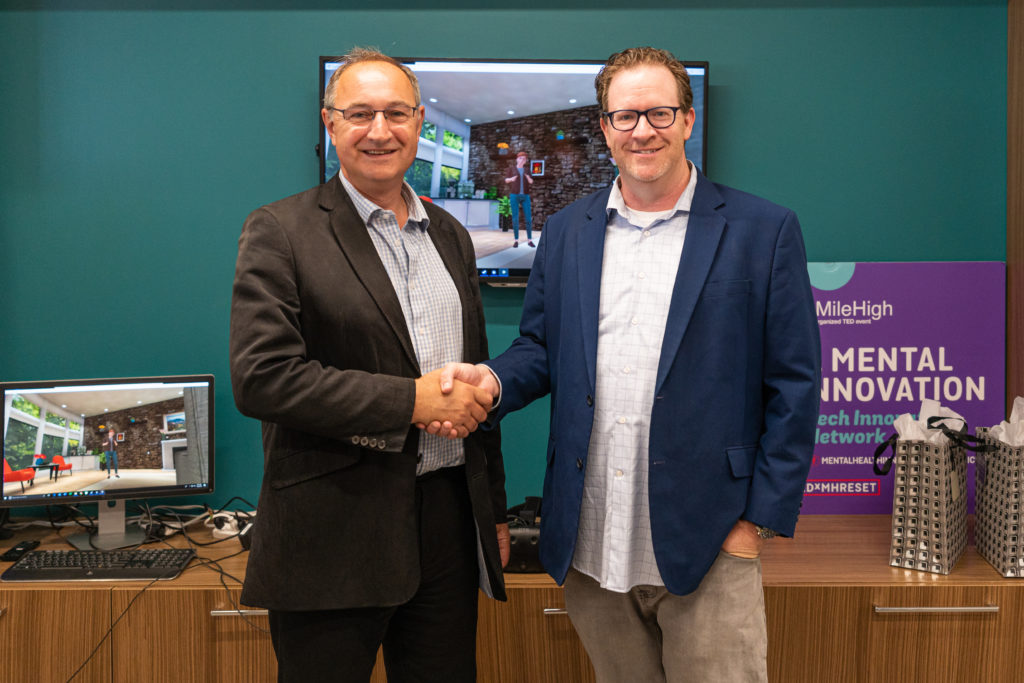July 26, 2019 – The National Mental Health Innovation Center (NMHIC) and Oxford VR (OVR) have announced a strategic partnership and the launch of multiple pilots using VR therapy treatment programs to advance mental health outcomes. The collaboration will involve testing of Oxford’s VR’s suite of automated evidence-based treatment programs, which use virtual reality (VR) technology to treat mental health conditions such as fear of heights, social anxiety, depression and OCD and psychosis.
According to both companies, the partnership signifies an important collaboration to improve access to innovative mental health care treatments that have the potential to drive breakthroughs in mental health access and outcomes, and provide insights into global applications.
Speaking about the announcement, Mimi McFaul, Deputy Director at NMHIC, said: “We thoroughly vet technology companies and look for specific quality metrics. This includes whether or not the technology is backed by research, is scalable, and has the potential for significant clinical impact. OVR meets all of these criteria and approaches mental health innovation with scaling and clinical impact in mind.”
Barnaby Perks, Founding CEO of Oxford VR, commented: “We are very excited to partner with NMHIC which is a world-renowned organization. Our collective vision is to turn the tide on life-interrupting mental illnesses by pushing the boundaries of clinical research excellence and technology to transform outcomes for service users. VR therapy is an evidence-based treatment whose time has come and can hugely benefit both clinicians and service users with its user-centered design and digitally-enabled solution. Great care has been taken to make the treatment programs clinically challenging yet also engaging and even fun by leveraging exciting gamification technology.”
VR therapy treatment is stand-alone and automated, which according to OVR, means its therapies can be used by themselves or as an added tool to progress existing cognitive treatments. OVR noted that in a trial of its fear of heights treatment program, participants who received the VR therapy showed a reduction in fear of heights, with an average reduction of 68.0%. The results indicated that the treatment was at least as good, if not better than face-to-face treatment for fear of heights, demonstrating its potential to treat a range of mental health conditions. The findings of the clinical trial were published in The Lancet Psychiatry in July 2018. This research was funded by the UK National Health Service (NHS) National Institute of Health Research to improve mental health access and outcomes.
OVR’s fear of heights program, uses VR to simulate heights safely so that users can experience and work through their fears and anxieties in a controlled environment. Users are guided by a virtual therapist through a series of tasks in a simulated shopping mall. By completing the tasks, users learn that they can use coping skills taught by the virtual coach to manage situations they previously found frightening.
The VR therapy will be implemented with the help of several community partners participating in the NMHIC Tech Innovation Network (TIN), including Mental Health Center of Denver (MHCD). The TIN is a network of clinical and community partners that leverages technology to augment, accelerate and facilitate effective mental health services across a range of settings. The partnership between NMHIC and OVR marks a step towards increased accessibility to mental health treatments.
Debbie Boeldt, Director of Digital Mental Health at NMHIC, said: “We have learned a tremendous amount from the TIN. Members of the network are eager to engage in trying new technology for mental health. Through our partnership with community partners, we often hear about barriers related to limited access to technology for mental health and a shortage of mental health providers. OVR provides an opportunity for clients to receive services through an evidence-based VR program.”
Image credit: Oxford VR
About the author
Sam Sprigg
Sam is the Founder and Managing Editor of Auganix. With a background in research and report writing, he has been covering XR industry news for the past seven years.

 In
In 


